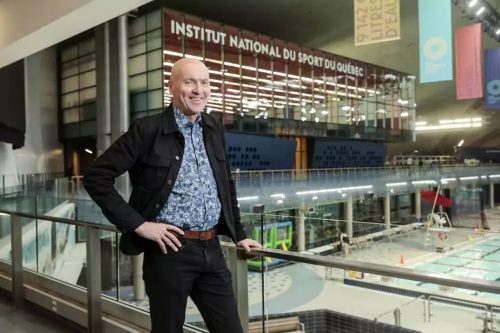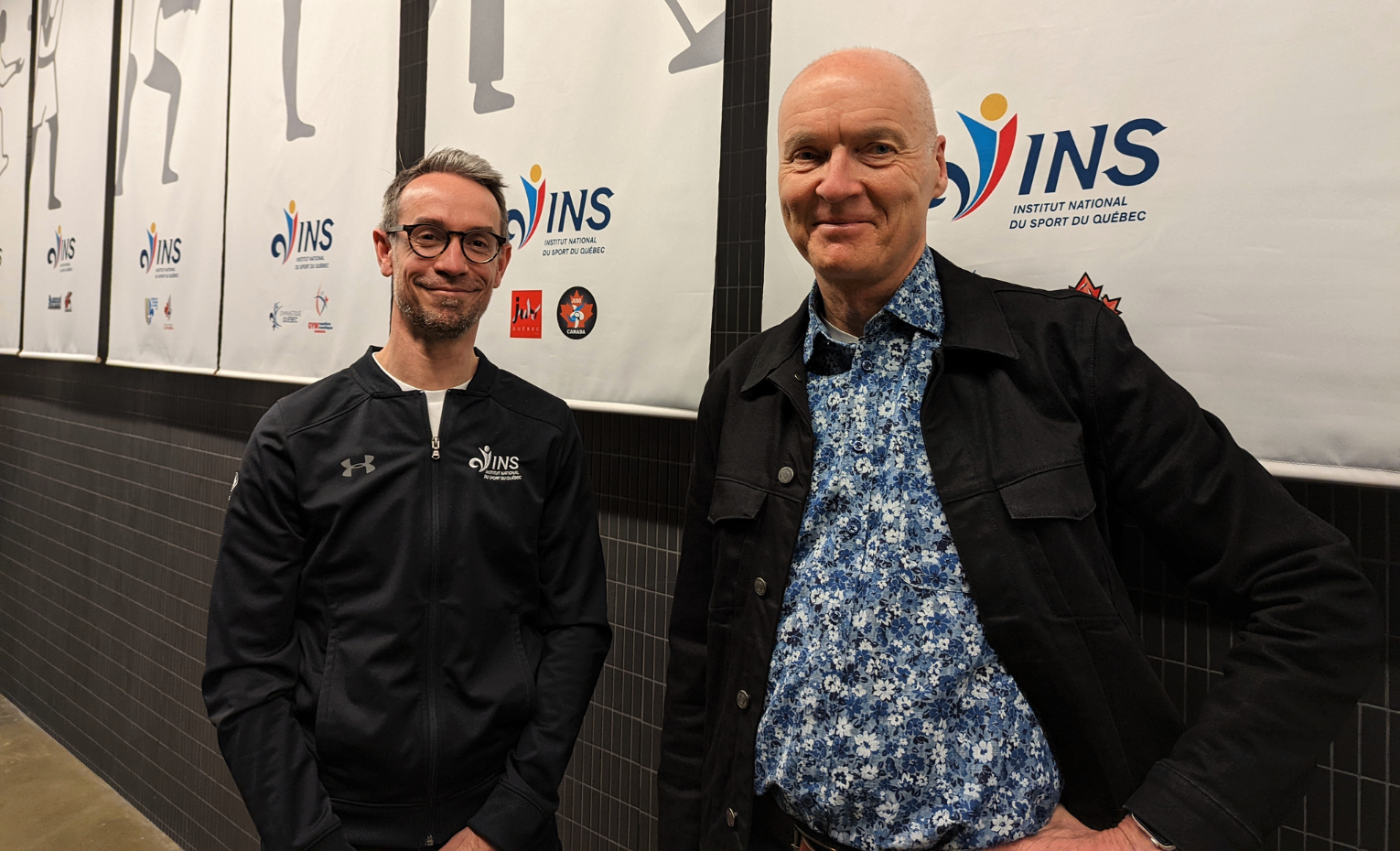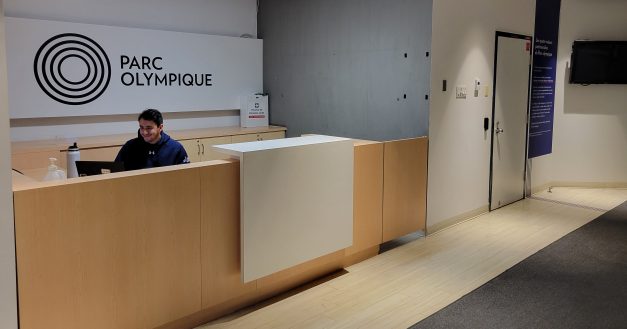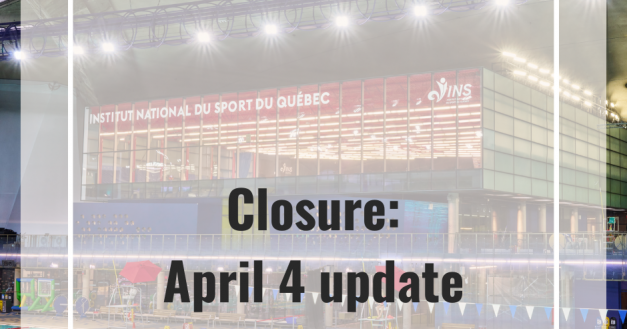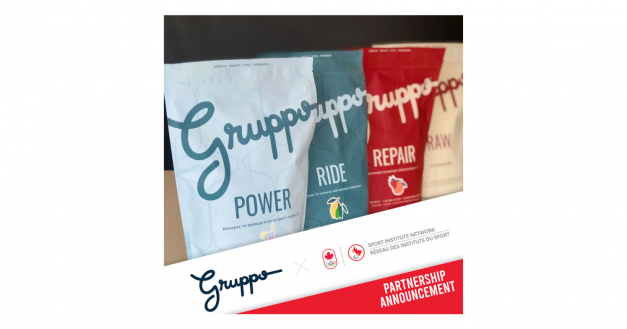SPORTS SCIENCES AT INS QUÉBEC: A CUTTING-EDGE SECTOR THANKS TO GUY THIBAULT
His time at the Institut national du sport du Québec (INS Québec) might have only lasted five years, but he certainly made his mark. At the end of March, Guy Thibault, Director of Sports Science, retired from his position. He’ll be leaving behind an impressive roadmap and a department that has seen unprecedented growth under his leadership.
The pandemic has stood in the way of everyone’s plans, including Thibault’s own retirement plans. He delayed his departure for a year to allow his successor, renowned physiologist François Bieuzen, to complete his work as head of the Integrated Support Team for the Canadian national short track speed skating team in the run-up to Beijing Olympic Games before starting his new role in early April.
So, it’s finally time for the new retiree to relax. Although Thibault is modest when it comes to discussing his achievements, the list of projects he’s undertaken alongside the Institute’s experts speaks for itself.
In 2017, he had already had a taste of retirement for almost a year “with the intention of never working again,” he said through a telling smile. It took some convincing by the directors at INS Québec to get him back to the world of work.
“I had plans to write books popularizing sports science, but after a month of hesitation, I finally came to terms with the idea that I’d be there for some time, perhaps until the Tokyo Games. However, as I discovered the extraordinary skills of the Institute’s scientists, I agreed to stay for longer.”
Breaking down barriers
Vision and collaboration are two lines of thought that have led his work toward a very specific goal over the past five years: making the INS Québec the hub of high-performance sports research.
Vision, because he made it his business to “predict the future,” in his own words, and to utilize the talents of all employees throughout the organization, and not just those in his department, by matching them to ideas. This is something he did during his doctoral studies in exercise physiology in the 1980s and 1990s as a young student. He took advantage of recent developments in micro-computing to create a new software for planning training; the first of its kind.
“I constantly ask the scientific team at the Institute to think about what will set sports nations apart in two, three or four Olympic cycles,” he said. “What do we not do now and what should we need so that Québec’s athletes shine on the international stage? This is why we have such great diversity in our research activities.”
The days when the Institute offered only day-to-day services to high-level training groups were over.
The Research, Innovation and Information Dissemination Program (PRIDI) was set up, and many research projects were launched as a result of the intensive and sustained commitment of scientists and members of the medical team at INS Québec, said Thibault proudly.
Among those hired by the new retiree is Research and Innovation Lead Thomas Romeas, a doctor of vision neuroscience.
“When he was hired five years ago, he told me that he had dreamed of creating a visual information processing laboratory to help top-level athletes. I couldn’t help but think that there were so many other, more traditional needs to be met in the fields of physiology, biomechanics or psychology. Quite frankly, I thought he was a really utopian. But today, INS Québec is home to an extraordinary neuroscience monitoring and advisory clinics specializing in visual information processing. We also have a partnership with the Université de Montréal. Thanks to Thibault’s leadership, the clinic that Thomas Romeas had always dreamed of is now a reality. But this couldn’t be done alone — we came together with the medical team. This is something we’re all really proud of.”
This achievement, like so many others, wouldn’t have been possible without opening up the organization’s internal structure so that everyone involved could join together to reach a common goal. It requires leadership to get members of one group to work so closely with members of another.
“When I started at the Institute, I was very clear: I wanted us to open up the structure. There’s a great deal to be gained from combining the interests, skills and ambitions of groups that actually have very different roles. And that’s how we came to achieve things that wouldn’t have been possible if the scientific team I lead hadn’t worked so closely with Dr. Suzanne Leclerc’s medical team.”
Focusing on the Next Generation
In sport, preparing the next generation of athletes is always part of strategic planning exercises. For Thibault, this is particularly important in high-performance sports sciences. He explained that when he started at INS Québec five years ago, it was pretty much a case of permanent scientists offering day-to-day services. Real research and innovation activities were few and far between.
“They basically had to do research in secret,” jokes the man who had already held positions as Researcher Emeritus in the Gouvernement du Québec’s Direction du Sport et de l’Activité Physique and as Scientific Advisor to teams preparing for the Olympic Games.
Consequently, the recruitment of undergraduate and graduate students has progressed over the years, and the team of a dozen scientists has grown to a group of nearly 50, carrying out as many as 80 research and innovation activities. This is another source of immense pride for Thibault, who constantly praises the passion and excellence of his team members.
“We’ve managed to create a dynamic that focuses on the next generation, and we’re training brilliant young people who are doing very high-level things. And that’s going to be a great advantage for the Canadian teams preparing for major games.”
Knowledge, but Above All Accessibility
To sum himself up in a single sentence, Thibault says he is “a scientist first and foremost, rather than a researcher.” In his eyes, this is a subtle but important difference.
“There’s a stubborn part of me that forced me to compromise. Once I understood that in the field of science, individuals are assessed based on scientific publications, it was all over for me. My goal is to make scientific knowledge accessible.”
He has indeed been helping to make sports science understandable for everyone, through books and magazines with a wide readership, not just in Québec but also internationally. As a lover of endurance sports and a keen amateur cyclist, he has first-hand knowledge of what athletes and coaches want to read to improve their performance.
“What matters most to me in life is someone who says, ‘Guy, I read one of your articles and I changed how I do things; and now I can see the results in my athletes.’ For me, this is the most moving feedback I can get.”
As you may have guessed, decades spent feeding on the latest scientific developments is not a habit you’re likely to break at the end of your career.
This is why, as of April, Thibault will continue to work on several projects that are close to his heart. These include publishing articles on his website Nature Humaine (in French), writing a book about cardiovascular training, mentoring university students and, lastly, working with his former INS Québec colleagues to finalize a web-based app for scheduling interval training sessions.
As he also takes part in virtual cycling competitions via Zwift several times a week, he’s unlikely to break a sweat when he gets there either.
Even retired, he’ll still be ahead of the pack!
########
Written by Sportcom for the INS Québec
Guy Thibaul in the media
The daily newspaper La Presse devoted a stroy to Guy Thibault on his departure from INS Québec.
Click to read the article (in French)
Photo – Martin Chamberland, La Presse
